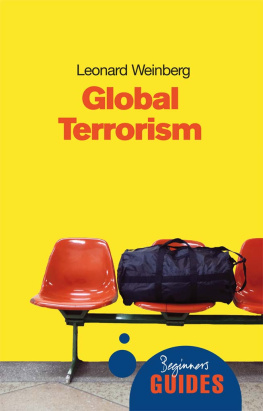Global Terrorism
A Beginners Guide
ONEWORLD BEGINNERS GUIDES combine an original, inventive, and engaging approach with expert analysis on subjects ranging from art and history to religion and politics, and everything in between. Innovative and affordable, books in the series are perfect for anyone curious about the way the world works and the big ideas of our time.
aesthetics
africa
anarchism
aquinas
art
artificial intelligence
the bahai faith
the beat generation
biodiversity
bioterror & biowarfare
the brain
british politics
the buddha
cancer
censorship
christianity
civil liberties
classical music
climate change
cloning
cold war
conservation
crimes against humanity
criminal psychology
critical thinking
daoism
democracy
descartes
dyslexia
energy
engineering
the enlightenmen t
epistemology
evolution
evolutionary psychology
existentialism
fair trade
feminism
forensic science
french revolution
genetics
global terrorism
hinduism
history of science
humanism
islamic philosophy
journalism
judaism
lacan
life in the universe
literary theory
machiavelli
mafia & organized crime
magic
marx
medieval philosophy
middle east
NATO
nietzsche
the northern ireland conflict
oil
opera
the palestineisraeli conflict
paul
philosophy of mind
philosophy of religion
philosophy of science
planet earth
postmodernism
psychology
quantum physics
the quran
racism
renaissance art
shakespeare
the small arms trade
the torah
sufism
volcanoes
A Oneworld Book
First published by Oneworld Publications, 2005
First published in the new Beginners Guide series, 2008
This ebook edition published in 2012
Copyright Leonard Weinberg, 2005
All rights reserved
Copyright under Berne Convention
A CIP record for this title is available from the British Library
ISBN 9781851686087
ebook ISBN 9781780741581
Typeset by Jayvee, Trivandrum, India
Cover design by Two Associates
Oneworld Publications
10 Bloomsbury Street
London WC1B 3SR
England
www.oneworld-publications.com
Stay up to date with the latest books, special offers, and exclusive content from Oneworld with our monthly newsletter
Sign up on our website
www.oneworld-publications.com
Foreword
It is hard to think of a more appropriate scholar than Leonard Weinberg to author Global Terrorism: A Beginners Guide. Leonard is Foundation Professor of Political Science at the University of Nevada, Reno and has a formidable track record as a specialist in the study of terrorism, political violence and extremism.
He has a masterly knowledge of the experience of political violence and extremism by major countries and this is reflected in his influential works, The Transformation of Italian Communism (1995) and The Emergence of a Euro-American Radical Right (1998, with Jeffrey Kaplan). Leonards understanding of the complexities of extremism and violence in the European democracies was deepened by his tenure of a Fulbright senior research fellowship in Italy and a visiting professorship at the University of Florence. However, he is a scholar with a wide range of interests and his work on the Radical Right with Jeffrey Kaplan, and his book Revival of Right-Wing Extremism in the Nineties (1997), which he co-edited with Peter Merkl, provided some ground-breaking cross-national comparisons of extremist movements, including analysis of developments in the United States. Leonard has also been applying his specialist knowledge to the daunting problems of ChristianJewish reconciliation for which work he received the Thornton Peace Prize in 1999. As co-editor of the academic journal Terrorism and Political Violence, I particularly value Leonards work as our book review editor, for which his qualities of academic rigour, fairness and breadth of knowledge have proved invaluable.
I warmly commend this book to readers who desire a concise, clear and balanced guide to the phenomenon of terrorism in todays world. The opening chapter on the concept of terrorism is both shrewd and immensely practical. He accepts that it is a contested concept. In that respect it is no different from other terms in our vocabulary of politics, such as democracy, imperialism and liberalism. Yet just as we cannot manage without concepts of democracy and imperialism we cannot dispense with terrorism. As Professor Weinberg makes clear, it is not a philosophy or a movement, it is an activity, which has been employed in a myriad of different political causes and campaigns. It follows that even those who sympathise with the beliefs and political aims of those who commit acts of terrorism are often profoundly opposed to the use of terrorism as a weapon to achieve such aims. In a democracy, where, by definition, dissenters can use the freedoms of an open society to campaign for their views peacefully, resort to the bomb and the bullet instead of the ballot box is morally indefensible. It is a fascinating paradox, therefore, that terrorist groups appear more frequently in democracies than they do in non-democratic societies. The good news is that well-established operative democracies generally show more resilience in withstanding and defeating the attempts of terrorists to undermine them. The majority of citizens of democratic countries generally prefer to hold on to their freedoms, despite the imperfections of democracy, and rally to support their governments attempts to suppress terrorism.
However, in reviewing the current terrorist scene, Leonard Weinberg makes clear that the al Qaeda network is far more dangerous to international peace and security than any previous international terrorist organisation. It is explicitly committed to the mass killing of civilians. In 1998 it announced the formation of the World Islamic Front for Jihad against Jews and Crusaders, saying it was the duty of all Muslims to kill US citizens civilian or military, and their allies, everywhere. The 9/11 attacks, and the series of deadly acts of terrorism since 9/11 show beyond doubt that al Qaeda has both the intent and the capability to kill large numbers of civilians in attacks around the globe. This is one of the key features of al Qaeda terrorism, which differentiates it from the more traditional groups. As Brian Jenkins famously observed, terrorist groups in 1970s wanted a lot of people watching, not a lot of people dead. It is all too clear that al Qaeda wants a lot of people watching and a lot of people dead. Another key difference is that al Qaedas political aims are non-negotiable. The terrorists want nothing less than the restructuring of the entire international order, including the removal of all the current Muslim governments they accuse of betraying the true Islam as defined by bin Laden. These aims are clearly non-negotiable. By contrast, more traditional separatist groups, for example, in Northern Ireland and Sri Lanka, have more limited and pragmatic aims and it is possible to conceive of peace processes in such conflicts succeeding, despite all the difficulties.














